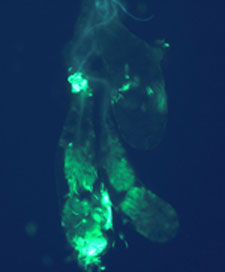Protein plays key role in transmitting deadly malaria parasite

John Adams, PhD, and his team study the complex life cycle of the malaria parasite (on computer screen) to try to find ways to block transmission of the deadly infection.
Tampa, FL (May 28, 2008) — The protein MAEBL is critical for completing the life cycle of malaria parasites in mosquitoes, allowing the insects to transmit the potentially deadly infection to humans, a University of South Florida study has shown. The research may ultimately help provide a way to better control malaria by blocking development of the malaria parasite in the mosquito.
Researchers with the USF Global Health Infectious Diseases Research team found that the transmembrane protein MAEBL is required for the infective stage of the malaria parasite Plasmodium falciparum to invade the mosquito’s salivary glands. Their findings were published May 28 in the online journal PLoS ONE.
“The mosquito is the messenger of death,” said the study’s principal investigator John Adams, PhD, professor of global health at the USF College of Public Health. “If we could eliminate the parasite from the mosquito, people wouldn’t become infected.”
Plasmodium falciparum causes three-quarters of all malaria cases in Africa, and 95 percent of malaria deaths worldwide. It is transmitted to humans by the bite of an infected mosquito, which injects the worm-like, one-celled malaria parasites from its salivary glands into the person’s bloodstream.

Dr. Adams, center, with his team including, l to r, Steven Maher, Fabian Saenz, PhD, lead author of the PLoS ONE paper, and Sandra Kennedy.
The study was done by genetically modifying the malaria parasites and feeding them in a blood meal to uninfected mosquitoes. Parasites in which MAEBL was deleted were not harbored in the salivary glands of mosquitoes, even though an earlier form of these parasites was observed in the gut of the mosquitoes. The researchers concluded that the transmembrane form of MAEBL is essential for the parasite to enter the mosquito’s salivary glands.
While more studies are needed, lead author Fabian Saenz, PhD, said the finding suggests that silencing the receptor for MAEBL in the mosquito salivary gland might block passage of the parasite through the mosquito, thereby preventing human infection through mosquito bites.
“Our study shows that MAEBL is a weak link in the parasite’s biology,” Dr. Adams said. “This could provide a potential way to block transmission in the mosquito, before the parasite ever has a chance to infect a new person. It is better to prevent the malaria infection from occurring in the first place than having to kill the parasite already inside humans with vaccines or drugs.”
The study was supported by a grant from the National Institute of Allergy and Infectious Diseases. Other study authors were Dr. Bharath Balu, Jonah Smith and Sarita Mendonca.

Microscopic view of an Anopeheles mosquito infected with malaria parasites.
– USF Health –
USF Health is dedicated to creating a model of health care based on understanding the full spectrum of health. It includes the University of South Florida’s colleges of medicine, nursing, and public health; the schools of biomedical sciences as well as physical therapy & rehabilitation sciences; and the USF Physicians Group. With $308 million in research funding last year, USF is one of the nation’s top 63 public research universities and one of Florida’s top three research universities.
